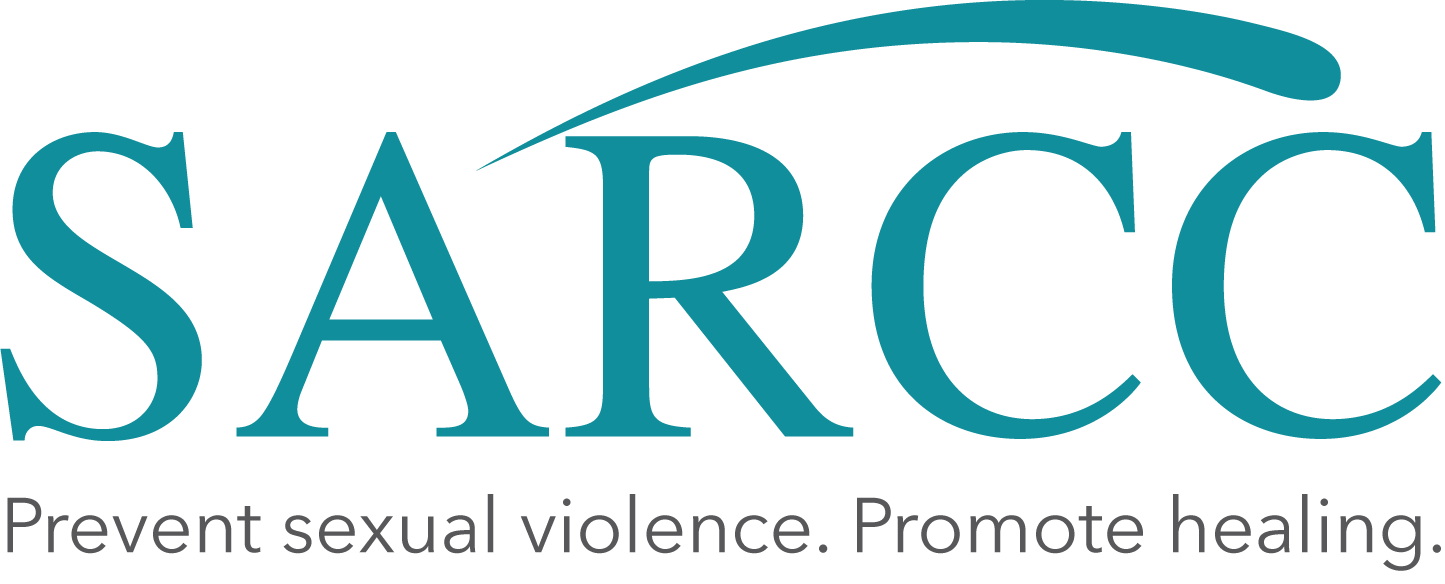If you have been following the SARCC blog for a while, you may have noticed that every year in November we issue a series on SARCCITUDE. We define SARCCITUDE as:
A positive mindset where someone feels appreciative and inspired to return kindness to someone who works at, with, or for SARCC.
In general, November is a time for gratitude and thankfulness in the United States. This year, we would like to focus on some of the circles of supportive relationships that we have seen can be incredibly helpful to survivors of sexual assault, sexual abuse, rape, and sexual harassment.
Our first SARCCITUDE discussion centers on parents and caregivers who create safe environments for kids surviving childhood sexual abuse. We also want to celebrate the efforts of proactive parents and caregivers who use skills and strategies to enhance protective environments for their kids.
Preventive strategies:
Our prevention educators will tell you how much they appreciate and hold SARCCITUDE for parents and caregivers to use some of these protective skills:
- Teaching your child proper words for private body parts.
- Sharing with your child that private body parts, which we sometimes refer to as bathing suit parts, our personal. For very young children, reminding them that only parents and caregivers or doctors who are helping them with their personal care can see those parts. And then, it is only for helping them with personal care.
- Starting early and talking often about relationship, relationships, consent, privacy, and boundaries.
- Providing access and support for basic needs. This includes safe, housing, appropriate clothing, food that is nutritious, and engaging with the important parts of their lives. If caregivers do not have the means to do these things, taking the steps needed to connect with support and resources is important.
- Reading to, singing to, talking to, and counting with your child from a very young age. These skills, sometimes called the basics, help to build connection and literacy.
- Helping your child to learn about and talk about different emotions. Recognizing when they may be overwhelmed and need a break. Showing that you can pause and reset when you get upset or frustrated.
- Noticing when your child does something right or well, and helping to provide support and feedback when they can improve. We sometimes call this social development strategy.
- Believing your child and helping them to set safe boundaries.
- Taking the time to educate yourself on grooming, behaviors, signs of sexual abuse, and how to prevent it.
While each of these things may seem simple, they actually go a long way in helping a young person build safe connections and have access to safe opportunities.
Support strategies after a disclosure:
First, it’s important to remember that if your child has disclosed experiencing sexual abuse, remember that they are still a child. They are still a young person who has things that they enjoy, quirky attitudes, adorable faces that they make, and things that they may want to share with you. Taking the time to notice these childlike qualities will help you to ground yourself and be a better support for your child. All human beings have challenging times, difficult experiences, and challenges that can color their lives. These struggles do not change who that person is at the core. This is especially true for young people.
When a child does make a disclosure of sexual abuse, we often talk parents and caregivers through three important steps for building a supportive environment:
- Listen
- Believe
- Act
Listen:
When a child makes a decision to talk about an experience of sexual abuse, it takes great courage. We often remind folks that child, sexual abuse survivors will often have creative ways of trying to share that something is wrong, even if they don’t say it explicitly. This may be Play that shows up in unusual ways, avoidance of people or situations, or disruptive or explosive behavior that seems to come out of nowhere. Listen to these signs that something is wrong and ask if you have a concern. If a child shares an experience of abuse, outright, start by taking a deep breath. Ground yourself and find a quiet place to give your full attention to the child. Especially for mandated reporters, it may be important to ask a few simple follow up questions to help you and making your report to child line. Using a calm, low voice when asking these questions or providing support will help to reassure the young person who is trusted you with this information. Sometimes, children are still figuring out the boundaries around talking about sexual abuse. Calmly setting those boundaries if someone is over sharing or it’s becoming disruptive to other activities and redirecting in a loving, kind way may be appropriate at times. In other cases, a child may avoid talking about the abuse outright. Making sure that they know that you are there to listen and to help if and when they are ready to talk more about, it will be important in these cases.
Believe: when the child does disclose in their way, make sure that you let them know that you believe them. Thanking them for sharing the information with you and providing opportunities for support and ongoing listening will help to show that you are showing up for them in every way you can. You can also the child that it is part of your job to help. Make sure that they and the people around them are safe and that telling you about what happened is an important way of helping you do that. Making a report to ChildLine is one way of demonstrating that you believe the child and that you are willing to help make their environment safer letting the child know that this is important and something that you have to do to help. Keep them safe can open the door for them to ask questions if they are unsure.
Act: taking appropriate action to help find support and resources for the child is an important step in building a safe response. Making a report to ChildLine is a good first step and is required for mandated reporters in Pennsylvania. Additionally, making adjustments to schedules, activities, after school care, or other childcare arrangements that helps to keep the child apart from the person they say is hurting them will be an important part of giving them the space and time to get the help that they need. getting your child connected to an advocate, therapist, or counselor at SARCC may be another way that you can act. Services for survivors of sexual abuse are completely free to folks living in Lebanon and school counties. If you happen to live in another part of Pennsylvania, another sexual assault center should be accessible and able to provide similar services.
Navigating the disclosure of child sexual abuse is challenging for the child and challenging for their non-offending caregivers. You do not have to figure this out alone. When caregivers take the time to get support and educate themselves, it helps them to create safer and more supportive environments for children. Children who have experienced trauma and hardship can still thrive and be healthy. Having safe adults, they can rely on makes a huge difference. If you have questions or need help learning how to be that safe adult or how you can build your skills for prevention, please don’t hesitate to reach out. Calling 570–6 28–2965 or 717–2 72–5308. Will connect you with a sexual assault counselor 24 hours.



